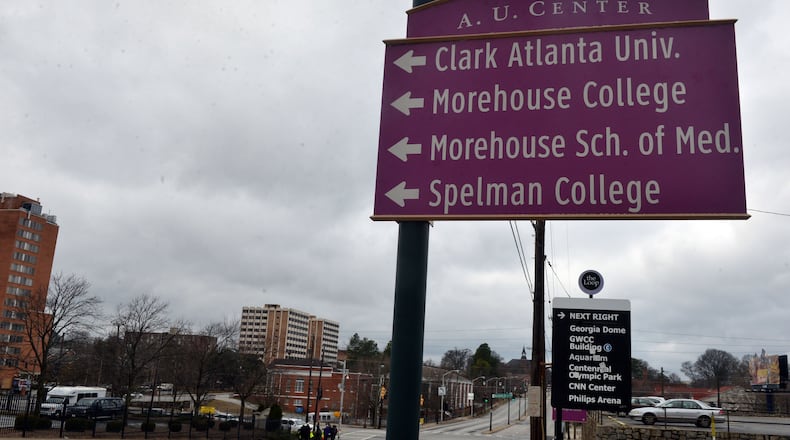In a guest column today, Scott Craft, a graduate of Albany State and Clark Atlanta universities, proposes merging Morehouse College, Spelman College, Clark Atlanta University and the Morehouse School of Medicine to form a new powerhouse Atlanta University.
Now, the four are part of what's known as the Atlanta University Center Consortium, the world's oldest and largest association of historically black colleges and universities.
Craft earned a master's degree in library and Information studies at Clark Atlanta University and is a professional of library science and academic and business research. In 2014, he was also among 100 librarians selected to attend the academic leadership institute at the Harvard Graduate School of Education. He has worked at several campuses in his career, including as a legal research librarian at Howard University.
By Scott Craft
For years, even prior to the consolidation of Clark College and Atlanta University, there had been discussion of merging the Atlanta University Center schools. These discussions never developed into action due to a number of factors including hubris, prestige, tradition, and lack of foresight.
With the recent events of so many struggling HBCUs such as Bennett College and Paine College, the AU Center should be seriously considering ways to sustain a more cohesive institution to withstand these types of economic and financial shortfalls.
Clark College and Atlanta University merged out of necessity. Atlanta University, as a standalone graduate school, suffered declining enrollment and its budget was under exigency. Clark was the most logical choice and the school that would benefit the most from a consolidation with Atlanta University.
Fourteen years later in 2002, Morris Brown lost its accreditation due to financial aid fraud, massive debt and embezzlement of public funds. In 2009, Clark Atlanta University was forced to fire 55 faculty members in response to what was deemed a budgetary and enrollment emergency. In the past few years Morehouse College suffered declining enrollment, budget shortfalls, a Moody credit rating drop and declines in national rankings of best black colleges.
These issues did not arise without cause. After the Civil Rights Act of 1968, schools became increasingly desegregated and this in turn made for more competition for the historically black colleges. With the Atlanta University Center schools operating independently, they make themselves increasingly more vulnerable.
The Atlanta University Center, with the right guidance, planning and strategy (not to mention sizable funding) could become the largest most prestigious black college in the country. If they could forego hubris, ego and status in order to look to the future, they could become a new Atlanta University that stands shoulder to shoulder with other city named schools such as New York University, Boston University and University of Chicago.
It would be the Howard University of the South. It's time for the antiquated, some would even say sexist and old-fashioned structure of all male and all female collegiate learning environments to end. This is not to dismiss the great legacy and work these schools have done, but to honor them by charting a new sustainable course where the legacy of these institutions can thrive.
Take the University System of Georgia's recent mergers and consolidations, for example. The USG has aggressively moved to consolidate several of its state college and universities of recent years. Over the past six years, the USG has merged or consolidated 20 of their public colleges and universities in an effort to streamline and restructure its system of schools as a cost saving measure.
There have been so many that it's almost hard to keep count. Some of the larger mergers were Kennesaw State and Southern Polytechnic State, historically black Albany State and Darton State, Georgia Southern and Armstrong State, Georgia Perimeter and Georgia State, and Augusta State and Georgia Health Sciences University.
The university system saw a vulnerability in its ability to effectively sustain the number of small to midsize public college and universities in operation. In response, it decided that rightsizing and restructuring the system by merging some of these institutions would not only potentially make the institutions stronger and more viable, but also help to thwart the effects of an economic downturn and enrollment declines.
The private Emory University had the benefit of sizable donations from Robert W Woodruff, the Coca Cola Foundation and Roberto Goizueta among other Coke dignitaries giving it the nickname Coca-Cola University. These donations essentially leapfrogged Emory past its peers, Mercer University and Oglethorpe University, into a powerhouse research institution.
I believe the Atlanta University Center schools could certainly merge without those levels of donations. However, if say, some philanthropists were to donate in the millions, or even in the billions of dollars to an Atlanta University Center merger, it could transform the consortium into a powerhouse research institution keeping its mission to serve the underprivileged and disenfranchised.
It would be a reincarnation of Atlanta University like it has never been seen before. The Morehouse school of Medicine could also consolidate into the institution, giving it an already fully operational medical school graduate program. Forming a law school would also be a great option given the lack of legal education opportunities in Atlanta. [There are only three law schools in the Atlanta area with one only recently receiving full accreditation from the ABA in 2005.]
The Atlanta University Center schools need to decide what is more important, legacy and namesakes of missionaries and abolitionists or joining forces as one powerful entity to chart a future for continued black educational excellence. Merge your schools and let Atlanta University be once again reborn like a phoenix.
About the Author
The Latest
Featured


